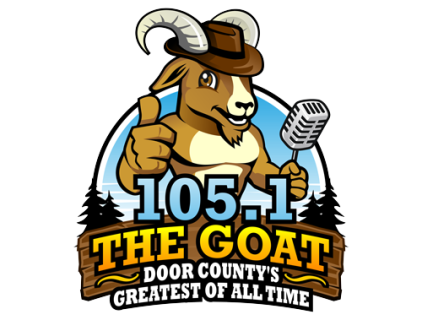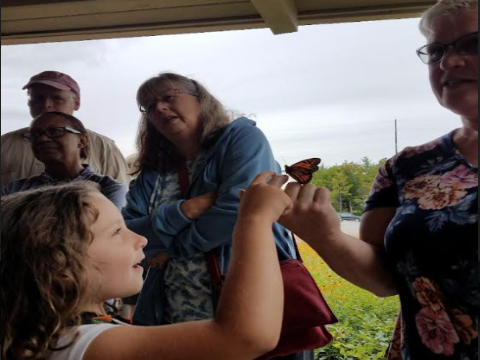Cross-pollination is important to many plants, and organizational cross-pollination is important, too. It enables Crossroads to host two special programs this week. Wild Ones of the Door Peninsula, the Door County Master Gardeners Association and Crossroads at Big Creek are co-sponsoring a Monarch Tagging Activity on Sunday, August 27 at 2:00 p.m.
A whole host of environmental groups—Master Gardeners, Wild Ones, the Door County Climate Change Coalition, the Door County Invasive Species Team, and the Door County Seed Library – with support from the Door County Medical Center – are collaborating with Badger Talks to present “Jumping Worms, the Biology, Impact and Control of a New Soil Invader,” at 6:30 p.m. on Thursday, August 31.
We haven't found jumping worms out on Crossroads’ preserves (yet), but during the past week or so, monarch butterflies, in numbers significantly greater than in the last two years, have been flitting about at Crossroads. Yet monarch-lovers who comb the fields for eggs are having very little luck. This is not a crisis. It is normal monarch butterfly behavior.
Understand that the “job” of a caterpillar is to eat. The “job” of a butterfly is to reproduce. For most of the butterflies fluttering around our preservers, this is more or less what happens.
But as Wild Ones board member and Master Naturalist Karen Newbern will explain during the Monarch Tagging Program, monarch butterflies are different.
At first, the monarchs behave like other butterflies. They mate, lay eggs, and the eggs hatch into caterpillars. When they mature, those monarchs also mate and lay eggs which metamorphose into butterflies.
But, according to Newbern, this time of year, it is almost like turning a switch. Instead of responding to the “mate and lay eggs” instinct, the newly matured monarchs respond to an alternate instinct – to migrate.
And they do. Without maps or GPS, the monarchs we find this time of year will migrate to the same groves of trees in Mexico in which their great-great grandparents spent last winter. We tag monarchs to assist in the research on why and how this mysterious migratory phenomenon occurs.
We understand monarch mating. When it comes to jumping worms, there is nothing to understand.
Jumping worms don’t have the instinct to mate. They are parthenogenic, which means a single worm can reproduce without mating. These invasive worms live just one year, but about now, for the second time, mature jumping worms are depositing tiny egg-filled cocoons which easily can survive a Wisconsin winter.
Because a single jumping worm can reproduce, a single cocoon could easily result in an infestation.
It shouldn’t take Wisconsin’s foremost authority on jumping worms, Brad Herrick, the Ecologist and Research Program Manager at the UW-Madison Arboretum to explain that a population of worms can increase exponentially.
He will explain that this is bad because jumping worms feed on organic matter and change the soil structure and chemistry. If your soil looks like coffee grounds and your plants are not growing because nutrients have been stripped from the topsoil, especially near mulched areas, you may have a problem.
Understand that predators such as birds and salamanders literally spit the worms out. (Chickens will eat them but shouldn’t. Moles seem to relish them, but that has other consequences.)
Oh, to the inevitable question: they don’t exactly jump, but they do flop and wriggle with considerable vigor and if they are agitated, they can drop their tails.
After Herrick’s Badger Talk, Sam Koyen, Door County Invasive Species Team Leader, will discuss what is happening in Door County, and Josh VanLieshout, Sturgeon Bay City Administrator, will discuss the City's plan of action.
The lecture is free and open to the public, but advance seating reservations are requested. Those interested can register on the Events page of the Crossroads at Big Creek website or at https://crossroadsatbigcreek.org/event/jumping-worms/
In the meantime, DCMGA is providing informational brochures for residents. At this time, brochures are available at Crossroads at Big Creek, SunnyPoint Nursery, Bonnie Brooke Nursery and at Door Landscape.
Crossroads at Big Creek Learning Center and Nature Preserve is located at 2041 Michigan Street, Sturgeon Bay. Crossroads is a 501(c)3 organization committed to offering education, conducting research and restoration, and providing outdoor experiences to inspire environmental stewardship in learners of all ages and from all backgrounds. We welcome your support.
Friday August 25
2:30 - 4:30 pm Tours of the Hanson House
Enjoy a free tour of the Hans and Bertha Hanson house to learn about life in the 1880s. Hands-on activities for kids. No reservations needed. The Hanson House is located at 2200 Utah Street, Sturgeon Bay.
Saturday, August 26
9:00 am Habitat Healers
Help heal the earth. Volunteers of all ages are invited to help with our land restoration efforts. Wear clothing and footgear that can get dirty and wet and bring a water bottle. Instruction, equipment, and gloves provided along with cookies and lemonade at the end. No need to register in advance and all ages are welcome. Meet at the Workshop at 2041 Michigan Street, Sturgeon Bay.
2:30 - 4:30 pm Tours of the Hanson House
Enjoy a free tour of the Hans and Bertha Hanson House to learn about life in the 1880s. Hands-on activities for kids. No reservations needed. The Hanson House is located at 2200 Utah Street, Sturgeon Bay.
Sunday, August 27
2:00 p.m. Monarch Tagging
Karen Newbern, a Wild Ones board member, Master Gardener, and Master Naturalist, will present a program on the monarch life cycle and migration. Then participants are invited to help to capture and tag butterflies at the Crossroads preserve. Instructions and equipment are provided. Free and open to the public. Sponsored by The Wild Ones of the Door Peninsula, Door County Master Gardeners, and Crossroads. Free and open to the public.
Thursday August 31
6:30 p.m. Badger Talk: “Biology, Impact & Control of a New Soil Invader and Plans for Door County”
Jumping worms have been found in at least three of Door County's compost sites. Brad Herrick, Ecologist and Research Program Manager at the UW-Madison Arboretum, will discuss why it matters that jumping worms have arrived, the long-term ramifications of their arrival, and ways to mitigate their impact and spread.
After Herrick’s presentation, Sam Koyen, Door County Invasive Species Team Leader, will discuss what is happening in Door County, and Josh VanLieshout, Sturgeon Bay City Administrator, will discuss the City's plan of action.
The lecture is free and open to the public, but advance seating reservations are recommended. Those interested can register on the Events page of the Crossroads at Big Creek website: https://crossroadsatbigcreek.org/event/jumping-worms/ The programs will be recorded and posted on the Master Gardener Website.






